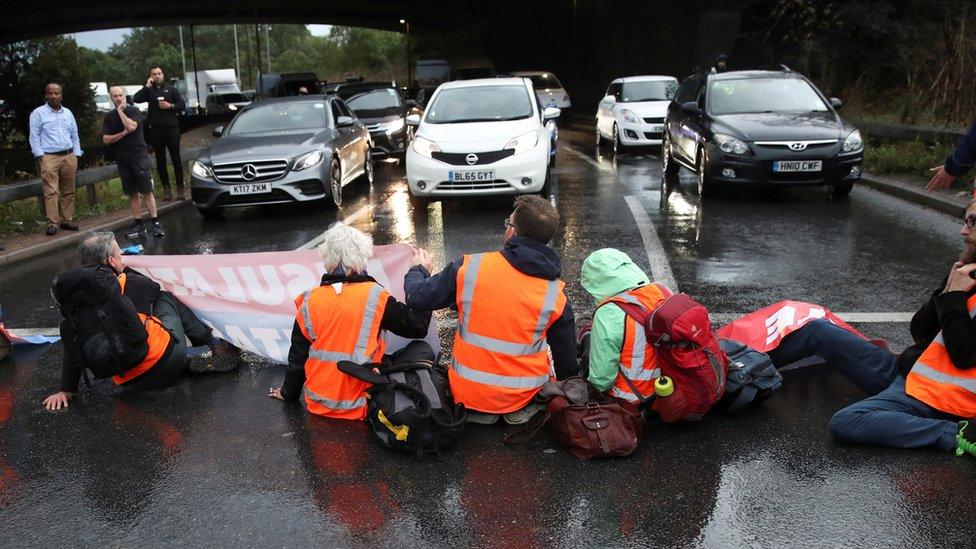Priti Patel outlines measures to curtail disruptive activists' travel
- Published
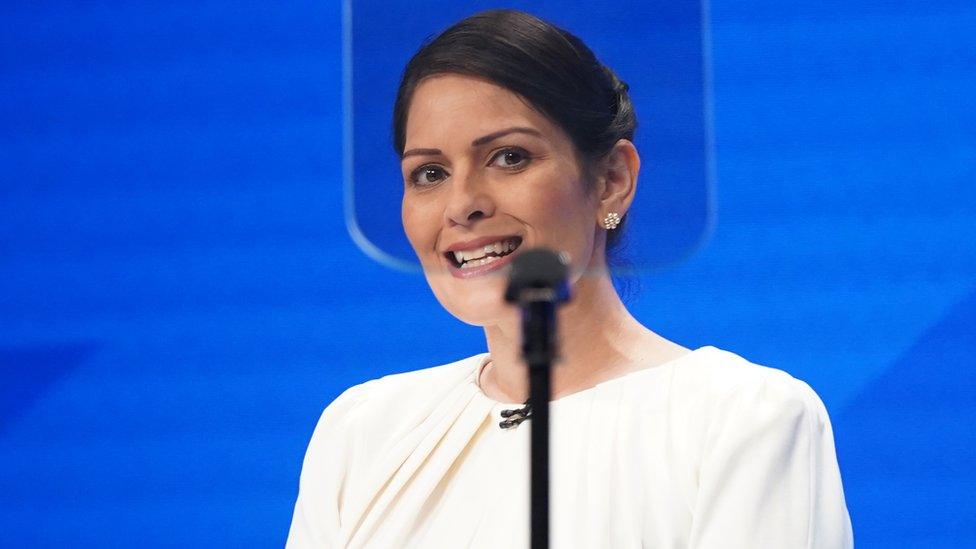
Courts will get new powers to stop disruptive activists attending protests, the home secretary has said.
In a Tory conference speech, Priti Patel said new orders would stop the "small minority of offenders" intent on "causing disruption".
A Tory source said they will target people with a "history of disruption", or those likely to commit crime.
Climate activists blocking roads have previously been warned they could face fines and up to six months in prison.
Protests from Insulate Britain have continued in recent days, despite three court injunctions banning activists blocking the M25, and other major roads in London, external.
On Tuesday the High Court heard that more than 100 protesters associated with the group have now been served with injunctions.
The group has apologised for disruption - but added that "the reality of our situation" on climate change has to be faced.
In her conference speech in Manchester, Ms Patel unveiled plans to increase the maximum sentence for disruption of a motorway.
She also announced a new criminal offence for interfering with critical national infrastructures such as roads, railways and newspaper printing presses.
Police are also expected to be given wider stop and search powers allowing officers to inspect activists for "lock on" equipment used to prevent them from being moved.
The new measures to be announced by Ms Patel are to be included in the Police, Crime, Courts and Sentencing Bill currently going through Parliament.
Ms Patel said the actions of climate activists, who in recent weeks have blocked the M1, M4 and M25, "amounted to some of the most self-defeating environmental protests this country has ever seen."
"Freedom to protest is a fundamental right our party will forever fight to uphold. But it must be within the law," she added.
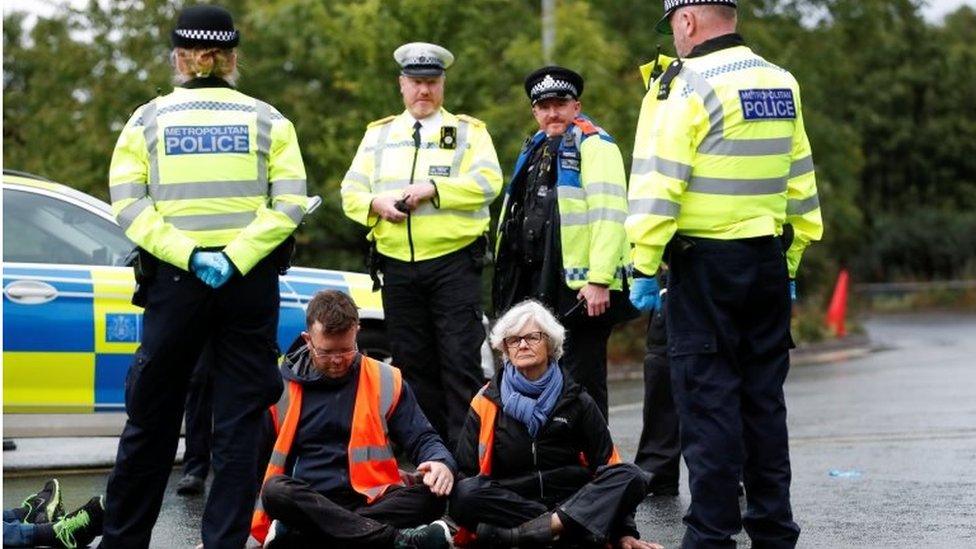
Insulate Britain activists blocking a motorway junction near Heathrow Airport
The campaign by Insulate Britain has been running for over three weeks and has led to hundreds of arrests.
The group wants the government to insulate all UK homes by 2030 to help cut carbon emissions.
On Tuesday, the High Court heard that 111 activists associated with the group had been served with injunctions.
A hearing on the injunctions has been adjourned to next week, after government lawyers argued all three should be dealt with together.
'Irresponsible crusties'
Speaking outside the court, an Insulate Britain spokesman said the group "wishes to profoundly apologise for the disruption caused over the past three weeks."
He added: "We cannot imagine undertaking such acts in normal circumstances. But we believe that the reality of our situation has to be faced."
On Tuesday, Prime Minister Boris Johnson described Insulate Britain activists as "irresponsible crusties".
He told LBC: "There are some people who call those individuals legitimate protesters."
He added: "They are not. I think they are irresponsible crusties who are basically trying to stop people going about their day's work and doing considerable damage to the economy."
Motorist: "I need to go to the hospital, please let me pass. This isn't OK... how can you be so selfish?"
On Monday, Insulate Britain activists were confronted by angry drivers as they blocked more London roads, including the entrance to the Blackwall Tunnel, Wandsworth Bridge, Arnos Grove and the Hanger Lane gyratory.
In a video captured by LBC, a motorist told demonstrators she was desperate to see her 81-year-old mother in hospital, asking them: "How can you be so selfish?"
In other footage shared by Talk Radio, angry motorists at Wandsworth Bridge were filmed dragging protesters out of the road, where an ambulance appeared to be blocked.
But in an open letter to Ms Patel, Insulate Britain said: "You can throw as many injunctions at us as you like, but we are going nowhere."
One activist told BBC News: "We have tried lobbying, we have tried targeting political leaders, government departments, people have been doing this for two, three, four, five decades, without any success at all.
"We know through history that disruptive direct actions work. The government are forcing our hand because they are not taking the biggest threat to humanity seriously."
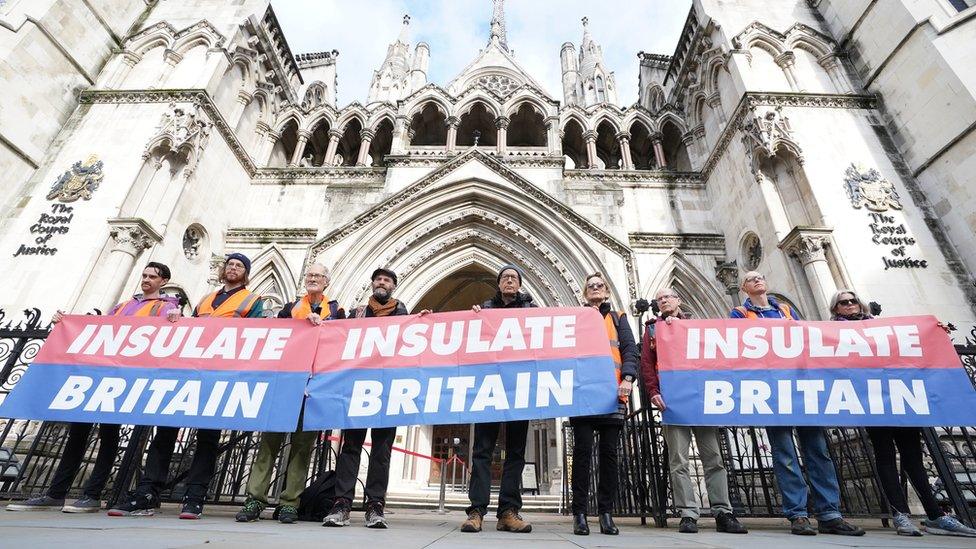
Members of Insulate Britain held banners outside the Royal Courts of Justice earlier
Meanwhile, Dominic Raab used his first speech as the new justice secretary to promise £183m with the aim of doubling the number of offenders in England and Wales on electronic tags by 2025.
He told delegates this included an expansion in the "game-changing" use of alcohol-monitoring ankle tags on offenders, to see if they breach court-ordered drinking bans.
Mr Raab, who was also made deputy prime minister in last month's cabinet reshuffle, also pledged £90m to pay for more hours of community payback by offenders.
Referencing the "harrowing" murder of Sarah Everard, he also vowed to make tackling violence against women and girls his "number one priority".

Have you been affected by issues covered in this story? Share your stories and video by emailing haveyoursay@bbc.co.uk, external.
Please include a contact number if you are willing to speak to a BBC journalist. You can also get in touch in the following ways:
WhatsApp: +44 7756 165803
Tweet: @BBC_HaveYourSay, external
Please read our terms & conditions and privacy policy
If you are reading this page and can't see the form you will need to visit the mobile version of the BBC website to submit your question or comment or you can email us at HaveYourSay@bbc.co.uk, external. Please include your name, age and location with any submission.
- Published27 July 2021
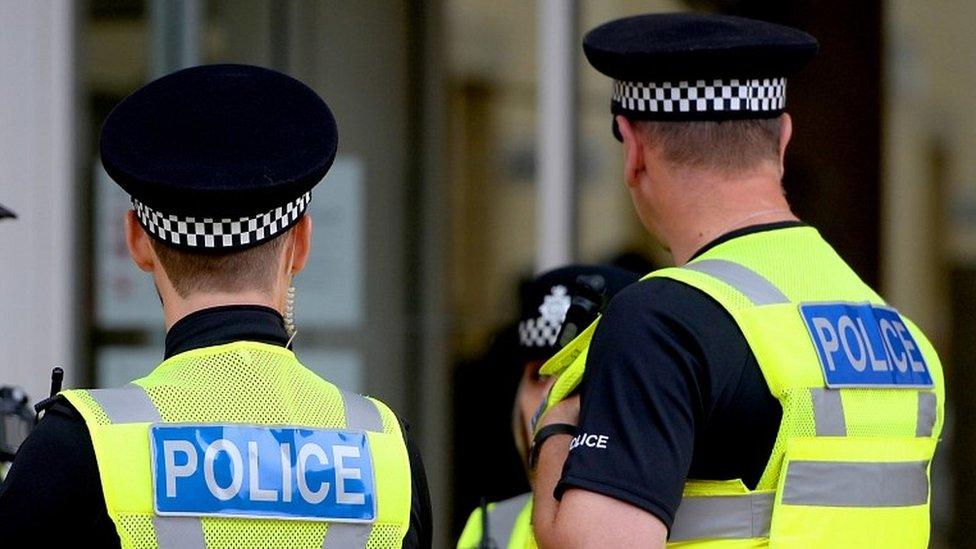
- Published2 October 2021
